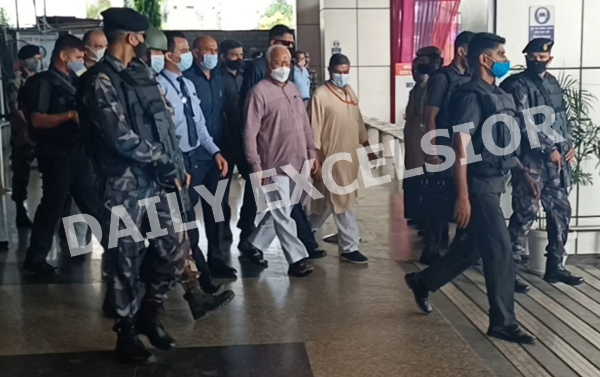
Bhagwat arrives on four days visit to Jammu
Avtar Bhat
JAMMU, Sept 30: Rashtriya Swayamsevak Sangh (RSS) chief (Sarsanghchalak), Dr. Mohan Bhagwat arrived here this afternoon on a four-day visit to the Union Territory of Jammu and Kashmir.
Click here to watch video
After landing at Jammu airport, Dr. Bhagwat straightway left for RSS Headquarter, Keshav Bhawan here at Ambhpalla. He was received at airport by Prant Pracharak, RSS, Rupesh Kumar and other senior leaders of Sangh and its sister organizations.
Tight security arrangements have been made at Keshaw Bhawan and RSS chief has been given four-tier security. Besides, the J&K Police the jawans of CRPF, SPG and SSB are manning the Keshaw Bhawan and entire area has been made out of bound for commoners. Moreover, elaborate security arrangements were made at Jammu Airport and enroute to Keshaw Bhawan, Ambphalla.
During his four-day stay at Jammu, Dr. Mohan Bhagwat will discuss various issues with the top leadership of J&K RSS including prevailing political situation in the UTs of J&K and Ladakh especially after annulling of Articles 370 and 35 A and conversion of J&K into two UTs in 2019.
RSS chief’s visit which is for the first time since the annulling of Article 370 and conversion of erstwhile J&K State into two UTs is considered of significant importance. The visit will boost the morale of the nationalist forces in the twin UTs.
Some national leaders of Sangh including Rameshwar Ji, Pracharak Pramukh, Bhanvir Ji Kshtriya Pramukh, senior RSS leader and member of its Akhil Bharatiya Karikarni, Indresh Kumar and Uttar Kshatriya Prachar Pramukh, Anil Ji besides, Pracharak from Ladakh, Paramjeet Singh have also reached Jammu to participate in various programmes and meetings to be held by Sangh chief during his four days visit to Jammu.
Sources said that besides, discussing the prevailing political situation in J&K, the RSS chief will also seek a feed back from the local Sangh leaders as well as the prominent people of Jammu who remained associated with the organisation since fifties about the ground situation in the twin UTs after the annulling of special status of J&K.
Sources said the RSS chief during a meeting with old associates of Sangh who have remained active in the 1953 Praja Parishad Movement and other pro nationalist movements in J&K during last five decades informed them that after the abrogation of Articles 370 and 35 A, another goal of Sangh is restoration of pre 1989 situation in Kashmir and rehabilitation of lakhs of displaced people there to revive the age old rich culture of Kashmir.
Sources said Dr Bhagwat made it clear that it is the prime responsibility of the Sangh and all nationalist forces in the country that the people who were forced to leave Kashmir on the barrel of gun are rehabilitated there with honour and dignity and ensure that under no circumstances the situation like 1989 should take place there in future.
He said this is another objective of the Sangh after the abrogation of controversial Articles 370 and 35-A which created a separatist tendency among a section of people in Kashmir which was also the root cause of over 30 year long turmoil in J&K.
The RSS chief, who held an informal meeting with the old Swayamsevaks of J&K today will formally interact with the RSS Pracharks of J&K and Ladakh tomorrow. He will also meet Swayamsevaks to get first-hand knowledge of the role played by the Sangh workers during the first and second waves of the COVID-19 pandemic.
During his stay, the Sarsanghchalak will get feedback about various projects initiated by the RSS in the Union Territory of J&K in the fields of village development, service (Sewa), public awareness, health, ecology, water conservation, social equality, education, etc. He will review the performance of these projects in Jammu and Kashmir and give his valuable suggestions to further accelerate service projects in different parts of the UT.
The formal meetings of the Sarsanghchalak with representatives of various organizations will start from tomorrow.
As per the tradition of the RSS, every year the Sarsanghchalak and Sarkaryavah travel all the provinces of the country to interact with prominent persons seek their feed back on political, social and other affairs.
Since its formation of the Sangh, it is a practice in the RSS that Sarsanghchalak and Sarkaryavah visit every province in connection with the organizational matters.
Following the same tradition, this year, RSS chief’s visit has been fixed in Jammu and Kashmir. It is for the first time after the abrogation of special status of J&K and Corona period, the Sarsanghchalak has visited Jammu. Last time he visited J&K in 2016.
Apart from various organizational meetings, the RSS chief will address a seminar at General Zorawar Singh Auditorium, Jammu University on October 2.
On October 3, Dr Bhagwat will address Swayamsevak of the Sangh through online mode across Jammu and Kashmir province. Swayamsevaks will gather at Mandals and Bastis level to listen to the online address of Sarsanghchalak.
He will also interact with Pracharks of the province as well as with selected dignitaries. He will visit the residences of senior RSS functionaries of J&K including Dr Gautam Mengi and Brig (Retd) Suchet Singh also on October 3 before leaving for the Union Capital.
After taking as RSS chief in 2009, Dr Bhagwat has visited J&K several times. Earlier as Sarkarivah (second inchief) of the Sangh, J&K has been top on his tour itinerary, a spokesman of the organization said.
Spokesman said the RSS has played an important role in accession of the J&K with Indian Union and it was the then RSS chief, Guru Golewalkar who visited J&K in 1947 after the then PM, Pt Jawhar Lal Nehru created a rift with then ruler of J&K Maharaja Hari Singh and Guru Golewalker pursued him to accede to India in the larger national interests.

